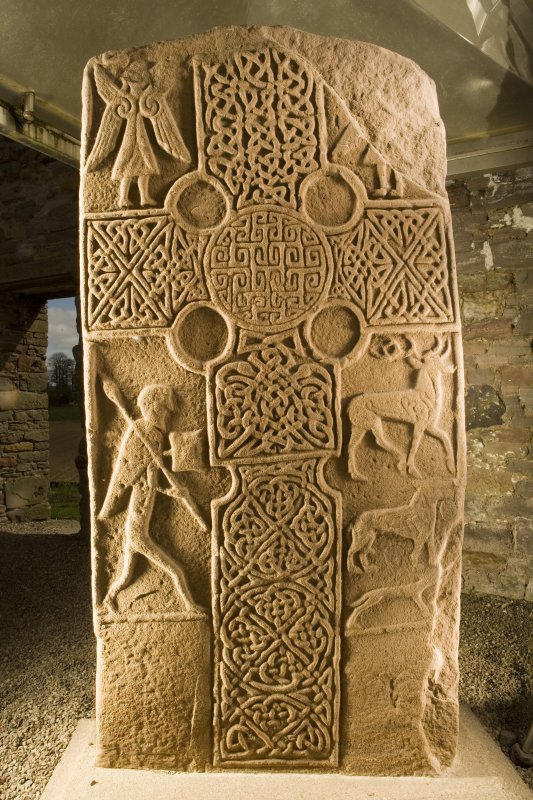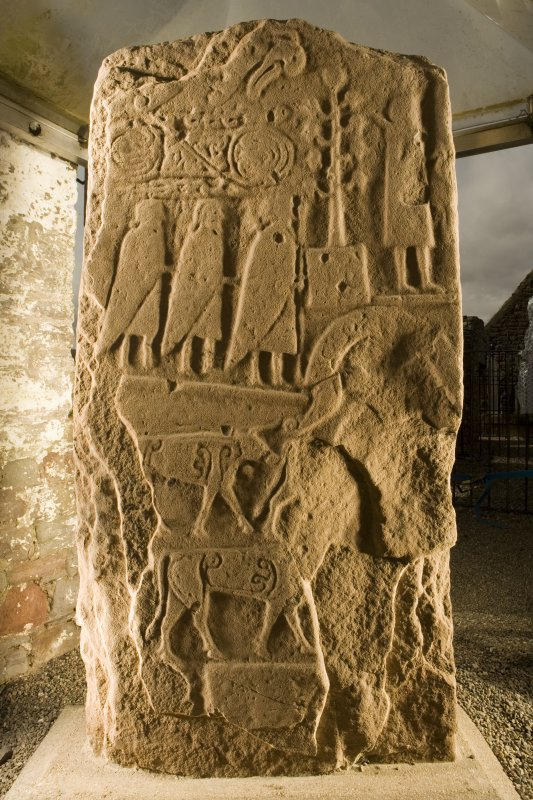Create an Amazon Wedding Registry

Shop Amazon - Create an Amazon Baby Registry
Pictish Cross Slab from Eassie, Angus, Scotland, 8th Century
Eassie (St Brandon), Angus, Pictish cross-slab
Measurements: H 2.03m, W 1.02m, D 0.23m
Stone type: Old Red Sandstone
Place of discovery: NO 3526 4745
Present location: in a glass shelter in the ruined church.
Evidence for discovery: found in the bed of a stream near the church in the late 18th century and erected at the east end of the ruined church by around 1830.
Present condition: weathered and damaged, especially on face C.
Description
This is an imposing slab with a low pedimented top and relief carving on both broad faces.
Face A is filled with an equal-armed cross with rectangular terminals set on a shaft, the whole outlined with a roll moulding.
The armpits are closed and circular, and there is a roundel at the centre of the cross-head. The arms and shaft are filled with interlace and the roundel with key pattern.
On either side of the upper arm is a double-winged angel with spiral joints to the wings.
Below the side-arm on the left-hand side is a warrior striding towards the cross, armed with spear over his right shoulder and a square shield held in his left hand.
The shield is very small and likely to be a fist shield or buckler for close combat (Ritchie 1969, 39).
Apart from a short cloak streaming out behind him, the warrior appears to be naked. To the right of the shaft is a stag,
oddly posed with its right hind leg and right foreleg touching. Below is a quadruped with clawed paws and below again a hound.
On the upper part of face C, and separate from the lower part by roll mouldings,
are a Pictish beast and an elaborately ornamented double disc and Z-rod above three warriors in tunics and long cloaks, the foremost of whom is slightly larger than the rest.
Each of the bearded warriors carries a long spear with leaf-shaped head in front of him and their hair falls to a roll on their shoulders.
To their right and at a slightly higher level is an apple tree in a square pot and a figure in a tunic with a club over the right shoulder and a round object,
perhaps an apple, hanging from the left hand. The rest of the right-hand side of face C is badly damaged,
and it is difficult to identify what was carved beneath the tree and the figure. Mack suggested an arch over a Pictish beast,
a combination familiar from elsewhere, but what resembles the hind leg of a beast, ending in a scroll, is carefully carved as if broken off the arched object above.
There are traces of spiral ornament within the arch. Below are at least three cows, the top one on the left with a curving horn and a bell at the neck.
All the figures and cows are moving towards the right.
Date range: eighth century.
Source: Canmore 28201
Previous: Pictish warriors on the Birsay Stone, Orkney, c. 700AD.
Next: Pictish Stone with man with axe from Rhynie, Aberdeenshire, Scotland, c. 700 - 800AD.
More Picts on Pictish Stones





